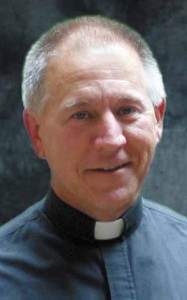By Fr. Bud Grant
I mean no disrespect to Pope Francis in opining that these chapters of “Laudato Si” are the least original in the entire text. This is deliberate. He links together “natural ecology” with the “human ecology.” This hearkens to St. John Paul II’s “Centesimus Annus” 38, expanded upon in retired Pope Benedict XVI’s “Caritas in Veritate” 51 (Nos. 48-52 constitute a “mini-encyclical” on the environment). Like nature, “man too is God’s gift to man.” Along with nature’s ecosystems, we must save societal structures, beginning with the family (CA 39) and on up to “international communities” (LS 142). The human ecology is economic, political, social, and even includes the “historic, artistic, and cultural patrimony” (150).

Just as ecosystems are threatened, so too are these densely layered networks of relationships. They all constitute the essential “quality of life” (153), not to be construed in an individualistic or material sense, but rather through moral theology’s oldest idea: the principle of the common good (156, c.f. “Gaudium et Spes” 26). The common good includes the marginalized (158), future generations (159), and the earth itself (160), all of which are under dire threat.
Here the Holy Father foresees the gloomiest horizons: “Doomsday predictions can no longer be met with irony or disdain. We may well be leaving to coming generations debris, desolation, and filth” (161) in a “spiral of self destruction which currently engulfs us” (163). Recently, I was told by a colleague that a certain parish was not going to invite me to speak there about the encyclical because “well, you are a bit of a downer.” Not to get defensive, but have they READ this chapter?
Yet, Pope Francis does not succumb to that most common ailment of environmentalists (peek ahead to 205: “All is not lost …”). Chapter 5 offers his broad suggestion for how we might land this plane before it crashes. He notes with optimism some of the progress that has been made in terms of international recognition of the problems. He comes out in favor of carbon trading (171) just as earlier he offered a qualified nod for genetically modified food sources (131). Yet his main point is not to critique or endorse specific strategies, but to plead for international cooperation which he sees as absolutely essential. This must include governments (he wrote this encyclical in cognizance of the Paris Earth Summit in December).
Most interestingly, and, I wager, most alarmingly to those who reject climate change — not due to any honest suspicions concerning science but rather to a legitimate fear of governmental over-reach — the pope urges “stronger and more efficiently organized international organizations” (175). Yes, he is talking about increasing the sanctioning power of international economic and development agencies… “a true world political authority” (ibid). This is eyebrow — raising, but not new — he cites Pope Benedict XVI, who is himself echoing St. John XXIII’s “Pacem in Terris,” in speaking about the United Nations and “economic institutions and international finance” (CinV67).
The defense of this seemingly “one-world-government” apocalypse (predicted to be “just months away” in one online source) is the notion of “subsidiarity,” first employed in Pope Pius XI’s “Quadragesimo Anno” (1931). Subsidiarity means that “the State ought to let subordinate groups handle matters and concerns of lesser importance” (QA 80). But the concept has a flip-side: “Thereby the State will more freely, powerfully, and effectively do all those things that belong to it alone because it alone can do them…” (ibid).
And that is all Pope Francis is saying: environmental crises are 1. real; 2. advanced; 3. human-caused; and 4. global. Only international cooperation and empowered institutions can “anticipate serious problems affecting us all” (LS 175). Once we recover from the whiff of a global conspiracy we realize that Pope Francis is really not saying anything new, just applying the Social Justice Tradition to this new — global — threat.
(Father Bud Grant is a professor of theology at St. Ambrose University in Davenport.)











